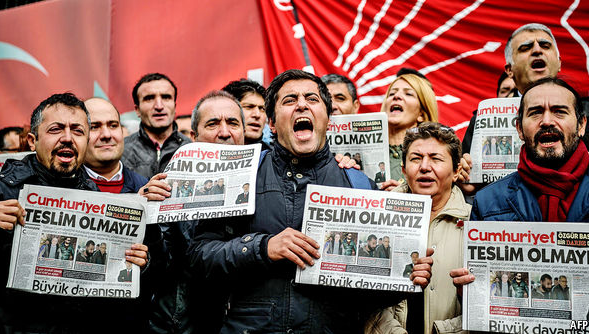
The Economist reports that Cumhuriyet or “Republic,” Turkey’s oldest daily newspaper and one of the last remaining non-government loyalist media outlets in the country, has been purged by Erdogan’s government. The October 31st crackdown detained Cumhuriyet’s current editor (its former editor already fled the country due to outstanding arrest warrants on him), its cartoonist, and around a dozen columnists and board members. Read the Economist in partial below, or in full here.
LOADED with page-turners such as the latest exam procedures for food inspectors, Turkey’s official gazette, the journal that archives the everyday business of state, used to be as good a cure as any for insomnia. No longer. In the wake of this summer’s violent attempted coup against the government of Recep Tayyip Erdogan, no newspaper in Turkey is read with more trepidation. With its lists of thousands of universities, news outlets and hospitals closed since the coup, and of the 100,000 officials sacked from state institutions, the gazette has turned into the chronicle of a seemingly insatiable purge. Under a state of emergency that allows Mr Erdogan to rule by decree, it may soon become the only Turkish paper worth reading.
Much of the media were already controlled by government loyalists. Now nearly all are muzzled or intimidated. Over a hundred journalists have been jailed. On October 31st the crackdown hit Cumhuriyet (“Republic”), a flagship daily of the secular left as old as modern Turkey itself. Police detained the paper’s editor, Murat Sabuncu, its leading cartoonist and a dozen or so columnists and executives. An arrest warrant was issued for its former editor, Can Dundar, who already faced charges for publishing articles on secret Turkish arms shipments. Mr Dundar fled the country earlier this year.
Prosecutors accuse Cumhuriyet of acting in cahoots with the Gulen movement, an Islamic sect suspected of engineering July’s coup, and with the Kurdistan Workers’ Party (PKK), which Turkey and Western countries consider a terrorist group. To most observers, that sounds bonkers. Cumhuriyet had been savagely critical of the Gulenists long before the ruling Justice and Development (AK) party, which allied itself with the movement for nearly a decade, broke with it around 2013.
The detentions suggest that few government critics are safe. Some 40,000 people, ranging from generals directly involved in the coup to Gulenist bureaucrats, Kurdish activists and leftist writers, have been detained since the summer. “[Erdogan] wants to establish a new country under his authority,” says Ozgur Mumcu, one of Cumhuriyet’s writers, “and everything the old Turkey represents will be eradicated sooner or later.”